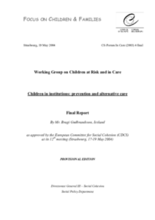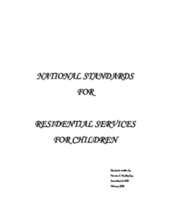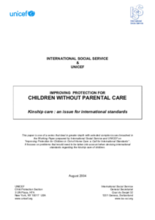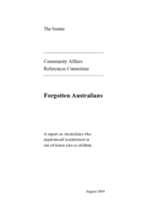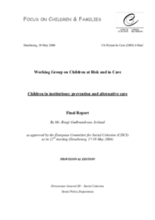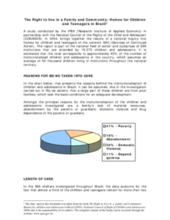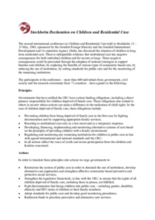Displaying 1401 - 1410 of 1463
A comparative analysis of protection and care systems across Europe, focusing on the use of institutions, alternative forms of care placements, family support services, and the role of social workers in the process of child placement.
Standards and criteria for the development of residential services for children in the Monteserrat, Turks and Caicos, and the British Virgin Islands.
Analyzes the state of institutional care in Zimbabwe against the national child protection policy. Focuses on the role of donors in the proliferation of institutional care and strategies to better regulate the development and provision of child protection services.
A brief fact sheet on the multilevel support needs of children without parental care. Includes a brief section on statistical data and examples of UNICEF action in several countries around the world.
Outlines problems and issues in providing appropriate out-of-home care solutions. Advocates for development of more comprehensive international standards for out-of-home care.
An informal evaluation of an NGO residential institution in Zimbabwe, based on the opinions of the child residents. Includes recommendations for the improvement of residential care.
Upwards of, and possibly more than 500 000 Australians experienced care in an orphanage, Home or other form of out-of-home care during the last century. This report shares their stories.
This report contains an overview of alternative care in Europe, the effects of institutions on children, statistical information and the different approaches of child protection systems within Europe. It includes reforming institutional care, foster care, post-care support, and the role of the social worker.
This research study provides statistical information on institutional care of children under the age of 12 in Brazil. Interviews with institutions and children are conducted, and reasons for separation from family, length of time in care, status of family relationship, religious orientation and financial support of the institutions are highlighted.
This document represents the agreements made at the Second International Conference on Children and Residential Care in Stockholm, Sweden, held from 12 to 15 May, 2003. The conference was sponsored by the Swedish Foreign Ministry and the Swedish International Development and Co-operation Agency (Sida). The document includes the principles and actions, regarding children and residential care, that were agreed upon by the participants at the conference.

